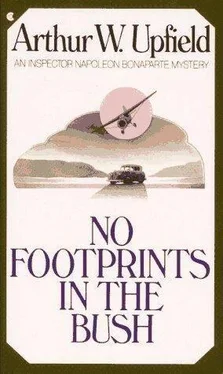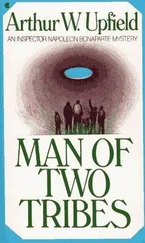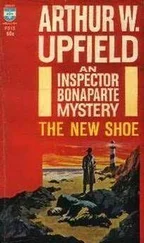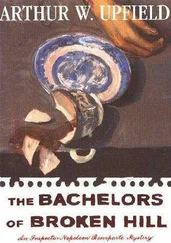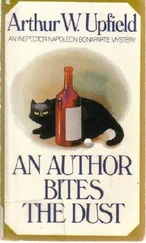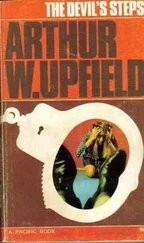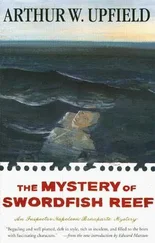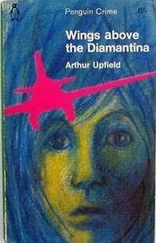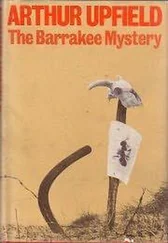Arthur Upfield - No footprints in the bush
Здесь есть возможность читать онлайн «Arthur Upfield - No footprints in the bush» весь текст электронной книги совершенно бесплатно (целиком полную версию без сокращений). В некоторых случаях можно слушать аудио, скачать через торрент в формате fb2 и присутствует краткое содержание. Жанр: Классический детектив, на английском языке. Описание произведения, (предисловие) а так же отзывы посетителей доступны на портале библиотеки ЛибКат.
- Название:No footprints in the bush
- Автор:
- Жанр:
- Год:неизвестен
- ISBN:нет данных
- Рейтинг книги:5 / 5. Голосов: 1
-
Избранное:Добавить в избранное
- Отзывы:
-
Ваша оценка:
- 100
- 1
- 2
- 3
- 4
- 5
No footprints in the bush: краткое содержание, описание и аннотация
Предлагаем к чтению аннотацию, описание, краткое содержание или предисловие (зависит от того, что написал сам автор книги «No footprints in the bush»). Если вы не нашли необходимую информацию о книге — напишите в комментариях, мы постараемся отыскать её.
No footprints in the bush — читать онлайн бесплатно полную книгу (весь текст) целиком
Ниже представлен текст книги, разбитый по страницам. Система сохранения места последней прочитанной страницы, позволяет с удобством читать онлайн бесплатно книгу «No footprints in the bush», без необходимости каждый раз заново искать на чём Вы остановились. Поставьте закладку, и сможете в любой момент перейти на страницу, на которой закончили чтение.
Интервал:
Закладка:
Without the slightest hesitation she had accepted him as her uncle’s guest, when he had appeared to her travel-stained, escorted by aborigines to the homestead instead of arriving on horseback or by car. She had evinced no hostility towards his mid-race; had accepted him without question.
Bony’s subsequent actions might have led an observer to form the opinion that his mentality was not normal. His eyes became brilliant orbs of blue radiating light. On his dark face was a smile more of gloating than amusement.
Snatching the dressing-gown from under the pillow he held it to his faintly quivering nostrils. Then he donned the garment, stood before the mirror, and turned himself to view the picture from every angle.
“Let me tabulate my emotions,” he murmured to the reflection in the mirror. “My brain feels stimulated. My spirit seems to be something light within me, something I can feel. It is as though Iwere intoxicated, and I’m sure this particular reaction is not due to the glass of lager I drank in the dining-room. Nor is it due to the prospect of solving a profound mystery. No. No! It is due to the gown itself. It is the kind of gown I would buy for myself-if I were not university educated, if I were not an inspector of detectives.”
Sighing, he removed the garment and again hid it beneath the pillow. Although certain the missing attache case was not among the articles of his swag he removed them all, before rolling up the swag and pushing it under the bed.
He was still on his knees when, through the open windows, came a human cry of distress. It was like a spring lifting him to his feet. Tensed, he listened. He heard now the sound like a man’s face being slapped, and this sound was instantly followed by another cry of distress. Out on the veranda, he again listened. For the third time the cry was uttered; and now he knew it came from the stockyards beyond the men’s quarters.
His room faced west. He stepped off the veranda, followed a garden path made of termite nests, skirted the detached kitchen and wash-house, and passed through a gate, to cross the open sandy ground to the long building, in the door frame of which was standing a white man dressed as a cook.
Beyond the men’s quarters, Bony saw over against the rails of the stockyard, a crowd of aborigines. Their backs were towards him. Among them was he whose cries answered the sound of face slapping. Then the group abruptly split asunder and Bony saw the duck-clad figure of the squatter. Then, like Jonah being spewed from the mouth of the whale, there shot from the centre a naked figure, who raced with astonishing speed along the northern fence of the garden, over the concrete wall of the dam, to disappear among the bloodwoods.
Towards Bonaparte came Chief Burning Water and Mr Donald McPherson, coiling his stockwhip. He said:
“There goes one of your late enemies, Inspector. I have been administering the McPherson justice. It is always better to flog than to hang. Hanging doesn’t hurt.”
Chapter Five
The Threat
MR DONALDMcPHERSON and his guest sat in cane chairs on the south veranda. The sunset colours had drained from the plain, lying two hundred feet below the house, and from the sky which now was a uniform pall relieved by the stars. Save for the croaking of bullfrogs by the dam it was very quiet.
“The blacks have buried the body of that Illprinka man killed this afternoon,” the squatter said.
“I know nothing about any body that required to be buried,” Bony lied, calmly. “Do you often flog an aborigine?”
“Very, very seldom. Chief Burning Water takes care of minor delinquents. He can hit hard. I taught him to box.”
“He’s an unusual man.”
“He’s outstanding among an unusual race. We grew up together. My father would not send me to a city school. He brought out tutors, three of them. They were all Scotch. Every one of them could recite all the poems of Burns, and they knew everything there is to be known about the tartans. They brought me up on Sir Walter Scott and the tenets of the Kirk*, and having made me an expert with the three R’s, my father took me in hand with the rules of business and keeping books. In many ways my father was shrewd and long-sighted-if he hadn’t been, he wouldn’t have survived here-but on one point he was not just to his only son. * Scots language name forThe Church of Scotland.
“By keeping me back from school down in a city where I would have rubbed shoulders with other boys and have gained a balanced outlook on life, he didn’t serve me too well. I never went off the place till I was twenty-two, and then it was to accompany the overseer and half a dozen blacks with cattle to what used to be called Hergott Springs, and from there down to Port Augusta.
“The only friend I had in my youth, in fact the only friend I’ve ever had is Burning Water. He’s three years my junior. My mother, who saw the want of a companion for her son, interested herself in Burning Water, and he proved worthy of her interest. What the tutors taught me I handed on to Burning Water. What I did, he had to do. My father took a great liking to him, and eventually he lived here as one of the family.”
“And yet he went back to his own people,” Bony said.
“He did, and he went back for a particular reason. When I became a man I was sealed into the tribe, and after Burning Water was made a man by his people we used to talk about the blacks a great deal. You see, I was, to all intents and purposes, brought up with them. I understood them, and through me Burning Water came to recognize what was good in our civilization and what was bad.
“Under the last head man, the tribe became loose and slovenly in obedience to its own laws and customs, and when he died, Burning Water decided to make himself head man and pull the tribe together. He and I both knew that the road to extinction was sign-posted by disregard for customs and contempt for laws. Burning Water felt he had a mission. Come to think of it, it is a damned fine mission.”
Bony rolled a cigarette. “And he has succeeded?”
“There’s no doubt about it. He pulled the tribe together in less than six months. He modelled himself on my father, for whom he had great affection and respect. He said to me one day: ‘What is the secret of life? The answer is, discipline. You white folk are strong because you know discipline. My people have become like a mob of steers because they have lost the discipline imposed by the laws and customs created for them in the Alchuringa. I must force them to respect the laws and follow the customs, so that they will become men and women and not just eating beasts.’ That he has done.”
Bony said. “Do you think it possible he had fore-knowledge of the attack on Errey’scar. ”
“Of course not.”McPherson spoke angrily. “Burning Water thought a lot of Errey, and Errey considered him a personal friend. Used to talk to Burning Water for hours about the aboriginal beliefs and customs. Burning Water often goes off alone. You see, it’s part of his job to visit the tribe’s sacred storehouses, and to keep an eye generally on the tribe’s land.”
“And has he had much trouble with the Illprinka tribe?”
“Not till recently. They became troublesome about six years ago. You know much about the blacks?”
Bony laughed, saying, as he stared at the void masking the fragrant garden and the plain beyond it:
“Enough to be convinced of how little I do know. Ah-there’s Price’s car!”
“Yes. He’s about where those cabbage-trees are. It’ll be too dark for him to see the wreckage of Errey’s car… Oh yes, the blacks are a damn sight wiser than we are. My father liked them, but he took a strong line with them. He had his troubles, you know. There were mother and my sister and me, the baby, and only two other white men and the wife of one of them. They were all here for years.
Читать дальшеИнтервал:
Закладка:
Похожие книги на «No footprints in the bush»
Представляем Вашему вниманию похожие книги на «No footprints in the bush» списком для выбора. Мы отобрали схожую по названию и смыслу литературу в надежде предоставить читателям больше вариантов отыскать новые, интересные, ещё непрочитанные произведения.
Обсуждение, отзывы о книге «No footprints in the bush» и просто собственные мнения читателей. Оставьте ваши комментарии, напишите, что Вы думаете о произведении, его смысле или главных героях. Укажите что конкретно понравилось, а что нет, и почему Вы так считаете.
